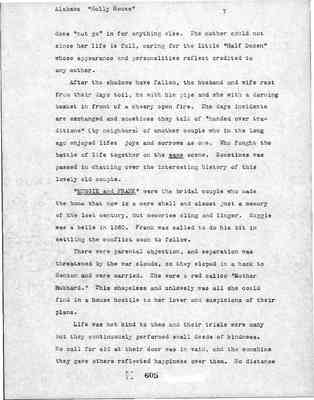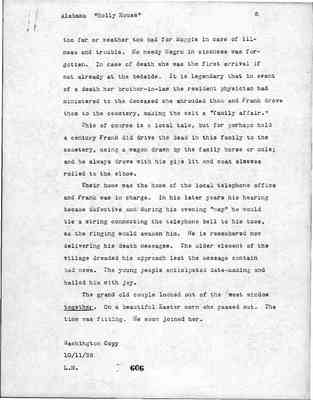Pages
Alabama "Holly House"
7
does "not go" in for anything else. The mother could not since her life is full, caring for the little "Half Dozen" whose appearance and personalities reflect credited to any mother.
After the shadows have fallen, the husband and wife rest from their days toil, he with his pipe and she with a darning basket in front of a cheery open fire. The days incidents are exchanged and sometimes they talk of "handed over traditions" (by neighbors) of another couple who in the long ago enjoyed lifes joys and sorrows as one. Who fought the battle of life together on the same scene. Sometimes was passed in chatting over the interesting history of this lovely old couple.
"MUGGIE and FRANK" were the bridal couple who made the home that now is a mere shell and almost just a memory of the lost century, but memories cling and linger. Muggie was a belle in 1860. Frank was called to do his bit in settling the conflict soon to follow.
There were parental objection, and separation was threatened by the war clouds, so they eloped in a hack to Benton and were married. She wore a red calico "Mother Hubbard." This shapeless and unlovely was all she could find in a house hostile to her lover and suspicions of their plans.
Life was not kind to them and their trials were many but they continuously performed small deeds of kindness. No call for aid at their door was in vain, and the sunshine they gave others reflected happiness over them. No distance
605
Alabama
"Holly House"
8
too far or weather too bad for Muggie in case of illness and trouble. No needy Negro in sickness was forgotten. In case of death she was the first arrival if not already at the bedside. It is legendary that in event of a death her brother-in-law the resident physician had ministered to the deceased she shrouded them and Frank drove them to the cemetery, making the exit a "family affair."
This of course is a local tale, but for perhaps hald a century Frank did drive the dead in this family to the cemetery, using a wagon drawn by the family horse or mule; and he always drove with his pipe lit and coat sleeves rolled to the elbow.
Their home was the home of the local telephone office and Frank was in charge. In his later years his hearing became defective and during his evening "nap" he would tie a string connecting the telephone bell to his toes, so the ringing would awaken him. He is remembered now delivering his death messages. The older element of the village dreaded his approach lest the message contain bad news. The young people anticipated date-making and hailed him with joy.
The grand old couple looked out of the west window together. On a beautiful Easter morn she passed out. The time was fitting. He soon joined her.
Washington Copy
10/11/38
L.H.
606

